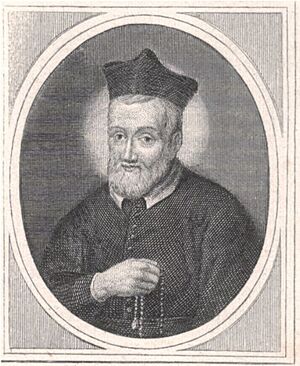Antonio Grassi facts for kids
Quick facts for kids BlessedAntonio Grassi C.O. |
|
|---|---|
 |
|
| Priest | |
| Born | 13 November 1592 Fermo, Papal States |
| Died | 13 December 1671 (aged 79) Fermo, Papal States |
| Venerated in | Roman Catholic Church |
| Beatified | 30 September 1900, Saint Peter's Basilica, Kingdom of Italy by Pope Leo XIII |
| Feast |
|
| Attributes |
|
Blessed Antonio Grassi (born Vincenzo Grassi on November 13, 1592 – died December 13, 1671) was an Italian Roman Catholic priest. He was part of a religious group called the Oratorians. Antonio was known for being very humble and religious. He especially loved Loreto, a special place for Mary, and visited it every year.
In his hometown of Fermo, people knew Antonio as a wise confessor (someone who listens to confessions) and a good advisor. He often helped settle arguments between different groups. Among the Oratorians, he was known for strictly following the rules of Saint Philip Neri.
Pope Leo XIII declared him "Blessed" on September 30, 1900. This is an important step towards becoming a saint.
Life of Antonio Grassi
Vincenzo Grassi was born on November 13, 1592, in Fermo, Italy. His parents were well-respected and made sure he had a simple and religious childhood. When he was ten, his father passed away, and Vincenzo also became very sick for a long time. After his father's death, he started getting spiritual guidance from Father Ricci, who had known Saint Philip Neri himself.
Vincenzo studied at the Curate of Saint Peter and also at the Church of S. Spirito dei Padri dell'Oratorio. On October 11, 1609, he joined the Oratorians and took the name "Antonio." He became a priest on December 17, 1617. Bishop Alessandro Strozzi of San Miniato ordained him. During his studies, Antonio learned a lot about the Bible (sacred scripture), the teachings of Thomas Aquinas, and the writings of early Church leaders (Church Fathers).
As a priest, Antonio was dedicated to teaching children about their faith. He helped them prepare for important religious ceremonies called sacraments. He spent many hours listening to confessions, believing that a priest's main job was to help and comfort people who wanted to confess their sins. The local Governor admired him so much that he put Antonio's picture in the town hall. This was to honor him for helping to make peace between arguing groups.
Antonio was also very generous. He gave help to all poor people and often asked for donations to continue his work. His fellow Oratorians sometimes thought he gave away too much. But Antonio believed that God would always provide what was needed.
In 1625, he went on a special trip to Rome. He wanted to receive a special blessing called the Jubilee indulgence from Pope Urban VIII. During this trip, he visited churches and places connected to the life of Saint Philip Neri. Father Consolini guided him and taught him even more about the saint. Soon, Pope Urban VIII and his advisors heard about Antonio's great holiness. This made the Pope respect Antonio very much.
Every year, Antonio also made a special trip to Loreto, a place dedicated to Mary. One time, on September 4, 1621, something amazing happened there. Lightning struck him, knocking him unconscious. But he was completely unharmed, though his clothes were singed. This was seen as a miracle.
In 1635, Antonio was chosen to be the leader of the Oratorians in Fermo.
Antonio became ill in 1671. The Archbishop of Fermo, Giannotto Gualterio, was with him when he passed away on December 13, 1671. Antonio told his fellow priests, "What a beautiful thing it is to die as sons of Saint Philip!" He was buried in the Chiesa del Carmine in Fermo.
Beatification Process
Cardinal Leandro Colloredo, who was also an Oratorian, asked for the process to make Antonio a saint to begin in Fermo. This led to an investigation into his life to see if he showed "heroic virtue" (great goodness). They also checked if two miracles had happened because people prayed to him.
After these steps were completed, Pope Leo XIII officially declared Antonio Grassi "Blessed" on September 30, 1900.
 | Jackie Robinson |
 | Jack Johnson |
 | Althea Gibson |
 | Arthur Ashe |
 | Muhammad Ali |

